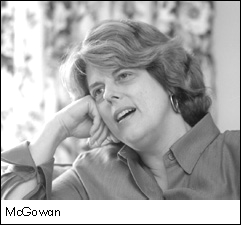The University Record, May 6, 1998
McGowan wants an accessible, interactive university
Editor’s Note: The following article is one in a series devoted to the Board of Regents as a governance organization and the eight Regents as individuals who share the concerns of the members of the University community.
By Rebecca A. Doyle
 Rebecca McGowan likes to get things done.
Rebecca McGowan likes to get things done.
“I’m somebody who likes to accomplish things,” she says. Her desire is reflected in the books she reads, her daily schedule and her commitment to making the University an accessible and interactive institution.
Pointing to a number of books that lie on coffee tables in her living room, Regent McGowan says she most likes to read biographies of people who have accomplished progressive things in their lives, often political biographies. She spends time at the desk in her home reading about the University and looking at the many letters and reports that are delivered daily.
“I literally get a pile of mail this high every day,” she says, indicating a four-inch stack of papers. “It’s not just from the Regents’ office–we get material from anywhere in the University. If somebody thinks it is important enough to send it, the responsible thing to do is to pay it some mind.”
It is not only through the mail that people contact her about current events on campus or issues they think she should know about. “I don’t go very many places where somebody doesn’t ask me about the University,” McGowan says.
But that’s the way it should be, she notes. Being a Regent of the University and living within one mile of the campus, McGowan says that her responsibility to the University and to herself and her family demands that she be an active participant in the life of the U-M and the community. “I really live this responsibility,” McGowan says. “People aren’t ever shy about telling me things wherever I go–even the grocery store–and it takes a lot of time.
“People say things to me about how much time it must take to be a Regent,” McGowan says. “But for me, that’s the point. I don’t want to be just peripherally attached to this University.”
Sometimes on her own and sometimes with six-year-old daughter Margot and husband Mike, McGowan has explored the music, art and intellectual corners of the
U-M, occasionally sitting in on classes, attending School of Music recitals and regularly visiting the Exhibit Museum. Her nephew has been a student at the School of Music, and McGowan is in her ninth year as a member of the University Musical Society board. Margot, she says, will remember the Exhibit Museum as part of her childhood.
How the University serves the community and the state is very important to McGowan.
“The issue of access is central to me,” she says. “I am concerned that the University be accessible to everyone who merits hiring or admission and the University must have enabling policies to achieve that.
“But once invited to become a member of this community, don’t just sit there,” she advises. “Everyone should be encouraged to take part in the fullness of the University. This is a fabulous place to live. Everyone should be an active participant.”
Noting that she does not have a sentimental attachment to the U-M– “I have no fond memories of walking through the Engineering Arch with my future husband or anything like that”–she says that her focus is on the value of the University to those who live near the U-M and those who live in Michigan.
“I emphasize that there is a great opportunity for those who live near the U-M to partake of an exemplary public institution. We are some of the few in the country who have such an opportunity,” she notes.
She says that her role as Regent is “not about sentimentality. It is about the future of one of Michigan’s greatest assets. I want to play a role in assuring that its place in the state and the world increases in the future.”
In her fifth year as Regent, McGowan discounts the idea of leadership of the board by any one member.
“The Board is made up of eight people, each of whom has equal claim to a seat. It is not a hierarchical body. Among us,” she says, “we understand who is particularly adept at what. There is a natural inclination to seek out their leadership. And leadership changes with each issue.
“It works out very nicely, and this board has been able to operate very well that way.”
McGowan spent many of her teen summers with the National Park Service and has a love of large spaces. Each summer, she and her family travel west to hike through the open areas in Montana or Colorado.
In addition to hiking, she enjoys swimming and uses it as both a physical release and a time to work out speeches, make lists, solve problems and “have angry conversations so I don’t have to have them for real.”

